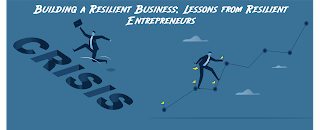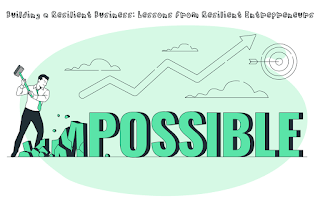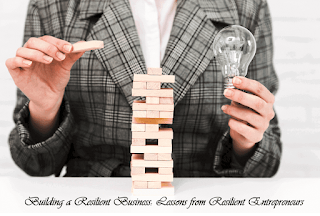Building a Resilient Business: Lessons from Resilient Entrepreneurs
In the dynamic and uncertain landscape of today's business world, the attribute of resilience holds greater significance than ever before. A resilient business is one that can adeptly navigate and flourish in the face of challenges.
Resilience is the ability to adapt to change and bounce back from setbacks. It is a critical skill for entrepreneurs, who often face unexpected challenges.
Resilient entrepreneurs embody the ability to rebound from setbacks and failures, utilizing these experiences as opportunities for growth and learning.
 |
| Building a Resilient Business |
In the ever-evolving landscape of entrepreneurship, resilience is a key trait that separates successful business owners from the rest. Building a resilient business isn't just about bouncing back from adversity; it's about thriving in the face of challenges and uncertainty.
Key Lessons from Resilient Entrepreneurs
Anticipate and Embrace Change:
Recognize change as an inevitable aspect of business, viewing it not as a threat but as a chance for adaptation and progress.
Consistently seek innovative ways to enhance business operations and maintain a competitive edge.
Build a strong support network:
Surrounding yourself with positive and supportive people can make a big difference in your entrepreneurial journey. Resilient entrepreneurs have a strong support network of mentors, advisors, and peers. They know that they can turn to these people for help and advice when needed.
Prioritize your mental health:
Entrepreneurship can be stressful and demanding. It is important to take care of your mental health in order to be resilient. Resilient entrepreneurs make time for activities that they enjoy and that help them relax and de-stress. They also know when to ask for help from a professional.
Establish a Solid Foundation:
Root the business in sound financial management, a clear vision, and strategy.
Invest in building a robust foundation to withstand unforeseen challenges.
Invest in Your People:
Acknowledge employees as valuable assets and invest in their development and well-being.
Foster a positive work environment, emphasizing employee growth through training and development programs.
Invest in your business:
Resilient entrepreneurs invest in their businesses, both in terms of time and money. They know that investing in their businesses will help them to grow and succeed. They also invest in their own skills and knowledge.
Cultivate a Culture of Innovation:
Promote a culture where creativity is encouraged, and employees are motivated to generate new ideas.
Invest in research and development to stay ahead in the market and introduce innovative products and services.
Prepare for Setbacks and Failures:
Develop a plan to respond to setbacks promptly.
Learn from mistakes rather than dwelling on them, enabling continuous improvement.
 |
| Building a Resilient Business |
Failure is a part of entrepreneurship. No one succeeds all the time. Resilient entrepreneurs learn from their failures and move on. They do not let setbacks define them.
Additional Tips from Resilient Entrepreneurs:
Build Strong Relationships:
Cultivate strong relationships with customers and partners to navigate challenging times successfully.
Diversify Revenue Streams:
Avoid dependency on a single product or service by diversifying revenue streams.
Maintain a Financial Cushion:
Aim to have at least six months of operating expenses saved for emergencies.
Self-Care is Essential:
Prioritize physical and mental well-being by incorporating exercise, relaxation, and quality time with loved ones.
 |
| Building a Resilient Business |
Building a resilient business is a gradual process that demands dedication. Resilient businesses are more likely to achieve long-term success even in adverse conditions.
Examples of Resilient Entrepreneurs
Sara Blakely, Founder of Spanx:
Overcame financial struggles and setbacks to establish Spanx as a multi-million dollar company. Blakely was rejected by 250 investors before she finally found funding for her business. She didn't give up, and Spanx is now a billion-dollar company.
Elon Musk, founder of SpaceX and Tesla:
Elon has faced numerous setbacks in his journey. However, his relentless pursuit of innovation and learning from past mistakes has made him one of the most influential entrepreneurs of our time.
Jeff Bezos, the founder of Amazon:
Amazon has faced many challenges over the years, including the dot-com bubble and the COVID-19 pandemic. However, Bezos and his team have always found a way to adapt and overcome these challenges.
Warren Buffett, the legendary investor and CEO of Berkshire Hathaway:
Warren is known for his prudent approach to risk. He invests in businesses with strong fundamentals and always has a margin of safety, which has allowed him to weather economic downturns and market volatility.
J.K. Rowling, the author of the Harry Potter series:
faced multiple rejections before finding a publisher for her first book. Her resilience and determination to bring her story to life turned her into a best-selling author and inspired millions of readers worldwide.
Richard Branson, Founder of the Virgin Group:
Started numerous businesses, faced failures, but persisted through innovation, making the Virgin Group highly successful. Richard attributes much of his success to the advice and mentorship he received from Sir Freddie Laker. Laker's guidance helped Branson navigate the turbulent airline industry and grow his business.
Arianna Huffington, co-founder of The Huffington Post and founder of Thrive Global:
Arianna is an advocate for well-being. She has often emphasized the need for a balanced life and the importance of sleep in maintaining productivity and resilience.
Steve Jobs, co-founder of Apple Inc.:
When faced with declining sales in the early 2000s, he led Apple's transformation by introducing innovative products like the iPod, iPhone, and iPad. This adaptability turned Apple into one of the most successful companies in the world.
Oprah Winfrey, Founder of Harpo Productions:
Overcame a challenging childhood and early career hurdles to become a highly successful media mogul. Winfrey had a difficult childhood, but she overcame these challenges to become one of the most successful people in the world. She is a role model for resilience and perseverance.
These resilient entrepreneurs serve as inspiring examples for those facing challenges in their entrepreneurial journey. The key takeaway is to persist in pursuing your dreams, learning from challenges, and adapting for success.
Conclusion
Constructing a resilient business is a challenging yet achievable endeavor. By adhering to the provided tips, entrepreneurs can enhance their chances of success and establish businesses capable of weathering any storm.
